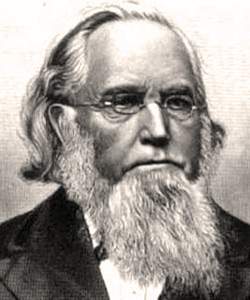Sidney Breese (American National Biography)
Denied renomination by his party, Breese returned to Illinois and plunged again into local politics. He served a term in the Illinois House of Representatives (1851-1852) and was elected Speaker in his first year. A war Democrat during the Civil War and a judicial activist, he helped to establish the legal foundations of a modern industrial society.
Sidney Breese (Congressional Biographical Directory)
Sidney Breese (Notable Americans)
Sidney Breese (Chicago Tribune)
JUDGE SIDNEY BREESE
Illinois has lost one of her ablest and purest officers. Judge BREESE died yesterday at an advanced age, at Mount Vernon, where he had been attending the session of the Supreme Court. For over fifty years he has been in the public service, and in every position has won distinction and honor by his inflexible integrity, his industry, and his great ability. For twenty-five years he has been a member of the Supreme Court of this State, and to the latest hour of his life worked faithfully in the public service. Though he has been known to the people of Illinois principally because of his brilliant judicial career, he was otherwise distinguished. His arrival in Illinois antedated the admission of the State into the Union, and one of the remarkable incidents of his history is the story, graphically described by himself, how, when the State Capital was changed from Kaskaskia to Vandalia, young BREESE packed the “State Government” in a buggy and transported it across the State to its new location. Judge BREESE has outlived all his contemporaries. For many years he had been accumulating and preparing the materials of a history of the State of Illinois, with which history he had been personally identified from its beginning. Large portions of this history he had written in detached pieces, requiring only such labor as might be necessary to make it a connected volume. He intended to publish this, expecting that from its sale he would have an income in his old age, and be some aid to his family after his death. But the Judge never felt himself old enough to conclude the work or prepare it for publication. Once, we believe, he had brought from his home at Carlyle as far as Ottawa a trunkful of his manuscripts, intending to put them in order, but, finding there was time enough, the papers were sent back, and remain until this day incomplete and unedited. There are but few men who can now supply such a history as he might have given to the public. The Judge was a scholar and a man of large and varied reading. He had peculiar ability and vigor as a write, and this last accomplishment adorns even the latest of his judicial opinious. He has fallen at his post, just where he would have selected to fall; he has lived a life of usefulness; has added to the world’s stock of knowledge; has died full of years and of honors, after a public life of unblemished character, and will take his place in the list of the great men of the State who, though younger than he, have gone before him.




